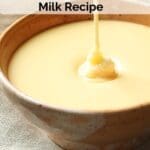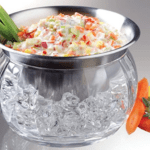Last updated on July 4th, 2024 at 11:30 pm
We’re talking about sweetened condensed milk. That lusciously thick and sugary elixir that has the power to turn your culinary creations into masterpieces.
In the realm of baking and dessert-making, there exists an enchanting ingredient that can transform ordinary recipes into sweet symphonies of flavor and texture. It’s the secret behind velvety ice creams, irresistible fudges, decadent pies, and so much more.
While store-bought sweetened condensed milk is readily available, there’s a certain kind of satisfaction that comes from making it in your own kitchen. Imagine having the ability to control the sweetness, customize the flavors, and create a batch whenever inspiration strikes. Whether you’re a passionate baker, a dedicated home cook, or simply curious about the magic of homemade pantry staples, this blog post is your ticket to sweet success.
We’ll talk about the art of making sweetened condensed milk from scratch. It’s easier than you might think, and the results are nothing short of spectacular.
You’ll not only discover the easy steps but also uncover valuable tips and tricks for making that perfect, velvety consistency. Prepare to elevate your culinary prowess and embark on a flavorful adventure as we delve into the world of homemade sweetened condensed milk.
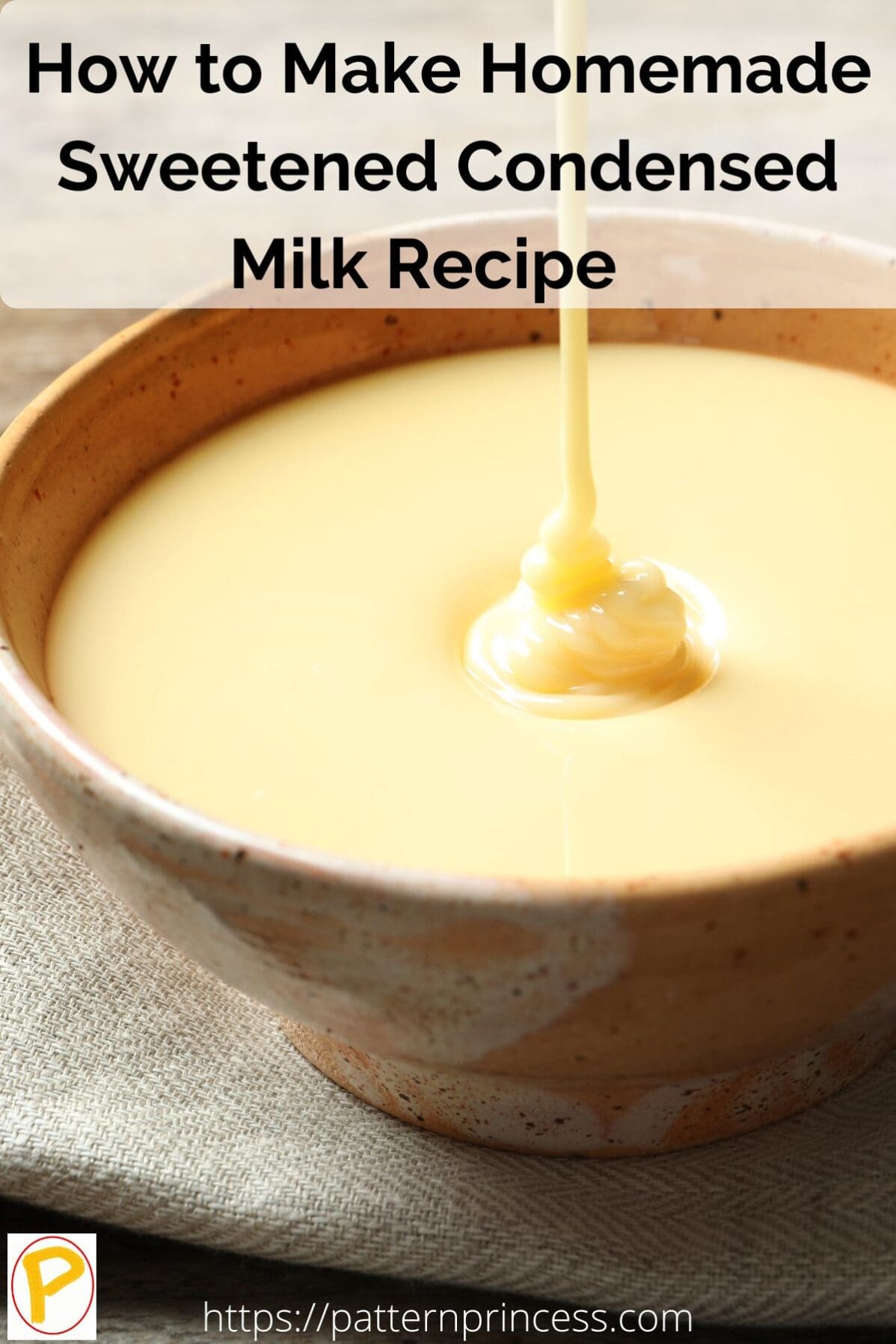
Post contains affiliate links, and we earn commissions if you shop through the links on this page. For more information, please read the disclosure section under the About Us page.
Homemade Sweetened Condensed Milk Recipe Ingredients and Substitutions
When making homemade sweetened condensed milk, it’s essential to understand the key ingredients and possible substitutions you can use to suit your dietary preferences or address allergies. Here are the primary ingredients and their potential substitutions:
Milk:
Dairy Milk: Traditional sweetened condensed milk is made with whole dairy milk. However, you can use low-fat or skim milk if you prefer a lighter version.
Dairy-Free Alternatives: If you’re lactose intolerant or following a vegan diet, you can substitute dairy milk with non-dairy options like almond milk, soy milk, coconut milk, or oat milk. Be sure to choose an unsweetened variety to control the sugar content, as sweetened non-dairy milk can make the condensed milk overly sweet.
Sugar:
Granulated Sugar: This is the standard sugar used in most sweetened condensed milk recipes. You can adjust the quantity to your preferred level of sweetness.
Alternative Sweeteners: If you want to reduce the sugar content or use a different sweetener, you can experiment with alternatives like honey, maple syrup, agave nectar, brown sugar, or coconut sugar. Keep in mind that different sweeteners may alter the flavor and texture of the condensed milk, so start with a smaller amount and adjust to taste.
Salt (Optional):
A pinch of salt can enhance the flavor. You can omit it if you prefer a completely sweet version.
Vanilla Extract (Optional):
Pure vanilla extract adds a lovely flavor. It’s optional but recommended for added depth. You can also experiment with other extracts like almond or coconut for different flavor profiles.
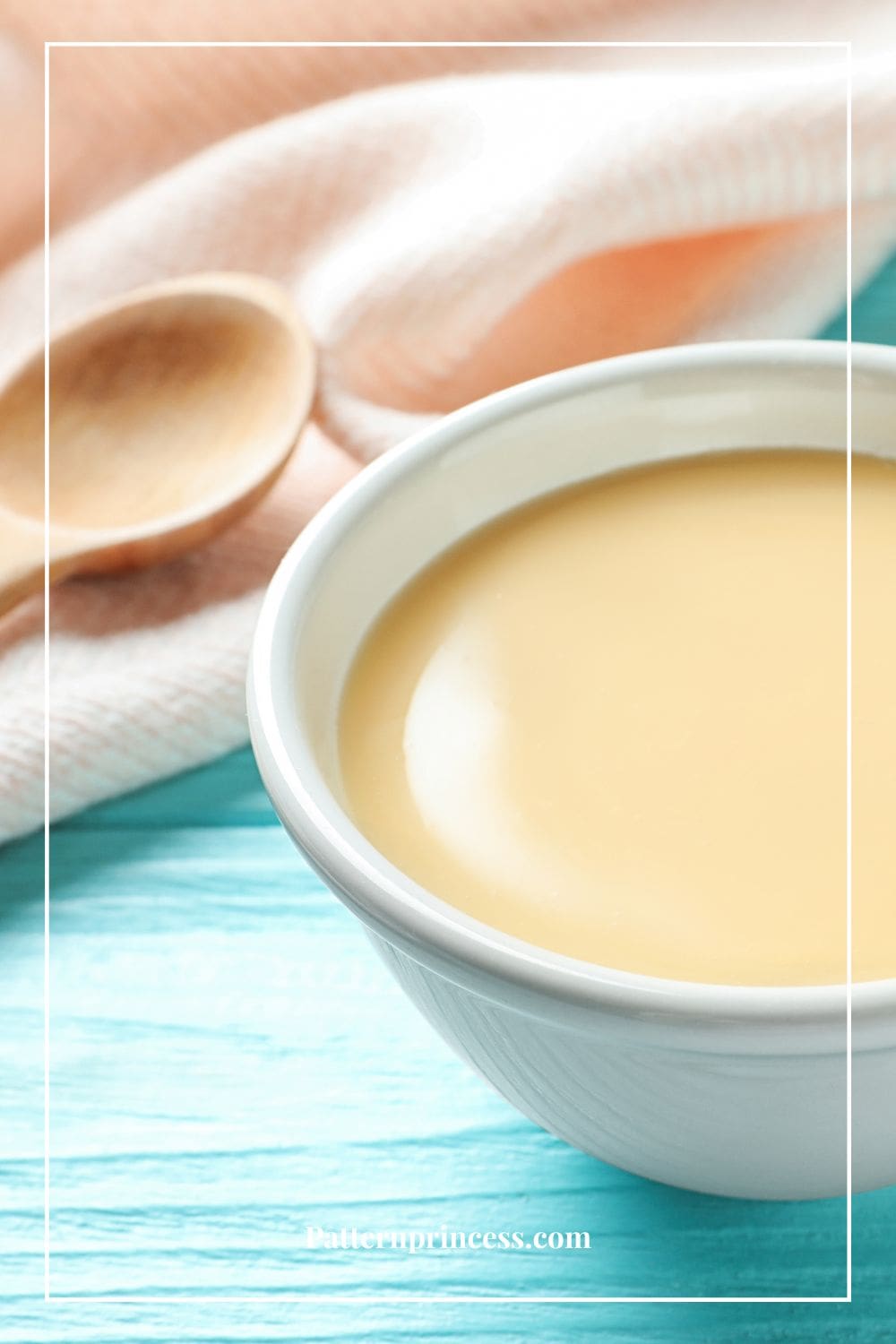
Recipe Tips:
For substitutions involving non-dairy milk, choose an unsweetened variety. To have better control over how sweet it turns out.
Keep in mind that different sweeteners have varying levels of sweetness. You may need to adjust the how much you add to achieve your desired taste.
When using alternative sweeteners like honey or maple syrup, they may also introduce their unique flavors to the condensed milk, So, think about how they will taste in your recipes.
Be patient when cooking and reducing the mixture, as this step can take some time. Stirring often is crucial to prevent sticking or burning.
Homemade may have a slightly different texture compared to store-bought versions. However, it should work well in most recipes calling for sweetened condensed milk.
Experimenting with different ingredients will surely result in a customized taste. Make one that suits your dietary needs and tastes while adding a personal touch to your recipes.
Is Condensed Milk and Sweetened Milk the Same?
“Condensed milk” and “sweetened condensed milk” are terms that are sometimes used in place of each other. However, they are not exactly the same. However, the primary difference between them is the presence of added sugar.
Sweetened Condensed Milk: This is the most common product and the one often referred to simply as “condensed milk.” It is made by taking out most of the water content from regular milk and then adding sugar to sweeten it. The result is a thick, sweet, and creamy liquid with a high sugar content.
Condensed Milk: Technically, it refers to milk that has had its water content removed, but without the addition of sugar. It is less sweet than sweetened condensed milk and is often used in savory dishes rather than desserts. In some countries, both terms may mean the same thing
In everyday conversation, people often use “condensed milk” when they are referring to “sweetened condensed milk” because sweetened condensed milk is far more common and widely used in recipes, especially for desserts.
If a recipe simply calls for “condensed milk,” it typically means sweetened condensed milk. However, it’s always a good idea to check the ingredient list and label when purchasing to ensure you get the right product for your recipe.
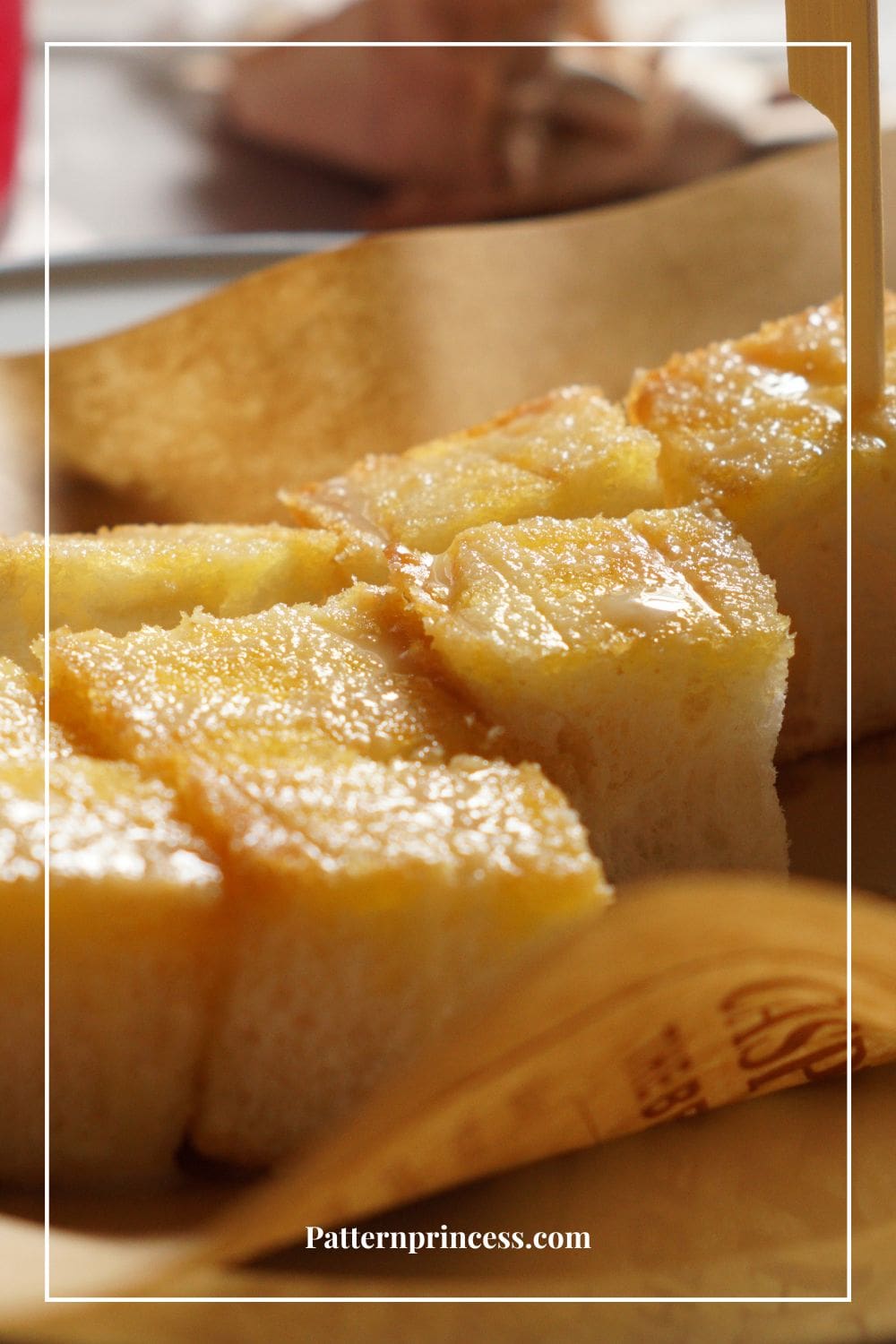
Why Do People Use Condensed Milk?
People use condensed milk for various reasons in cooking and baking due to its unique qualities and versatility. Here are some of the primary reasons why condensed milk is a popular ingredient:
Sweetness: Condensed milk is exceptionally sweet due to the added sugar, making it an excellent sweetener for desserts, beverages, and recipes that require a rich, sweet flavor.
Creaminess: It has a thick and creamy texture that can add a luxurious mouthfeel to a wide range of dishes, from ice creams to fudges to creamy cocktails.
Versatility: Condensed milk is incredibly versatile and can be used in both sweet and savory dishes. It can enhance the flavor and texture of a variety of recipes.
Long Shelf Life:
Condensed milk has a long shelf life, making it a convenient pantry staple that can be stored for extended periods without refrigeration until opened.
Caramelization:
When sweetened condensed milk is heated, it undergoes a transformation into a rich caramel-like substance called dulce de leche. This is a popular spread and dessert component in many cuisines.
Ease of Use:
It eliminates the need to combine milk and sugar separately in recipes, saving time and ensuring a consistent sweetness level.
Dessert Base:
Condensed milk serves as a fundamental ingredient in a wide range of desserts, including pies, puddings, cakes, and bars. It provides the creamy, sweet foundation for many beloved sweet treats.
Binding Agent:
In some recipes, sweetened condensed milk can act as a binding agent, helping to hold ingredients together.
Coffee and Tea:
Many people enjoy adding it to their coffee or tea for a rich and sweet flavor without the need for additional sugar.
Customization:
It can be flavored with various extracts or mixed with other ingredients like cocoa powder, coconut, or fruit puree to create unique dessert fillings or toppings.
Texture Enhancement:
In no-churn ice cream recipes, it helps create a creamy, scoopable texture without the need for an ice cream maker.
International Cuisine:
Condensed milk is a key ingredient in various international dishes, such as Vietnamese iced coffee, Indian sweets like gulab jamun, and Latin American tres leches cake.
Overall, condensed milk’s sweet and creamy nature makes it a beloved ingredient for achieving rich and delectable flavors in a wide array of culinary creations, both sweet and savory.
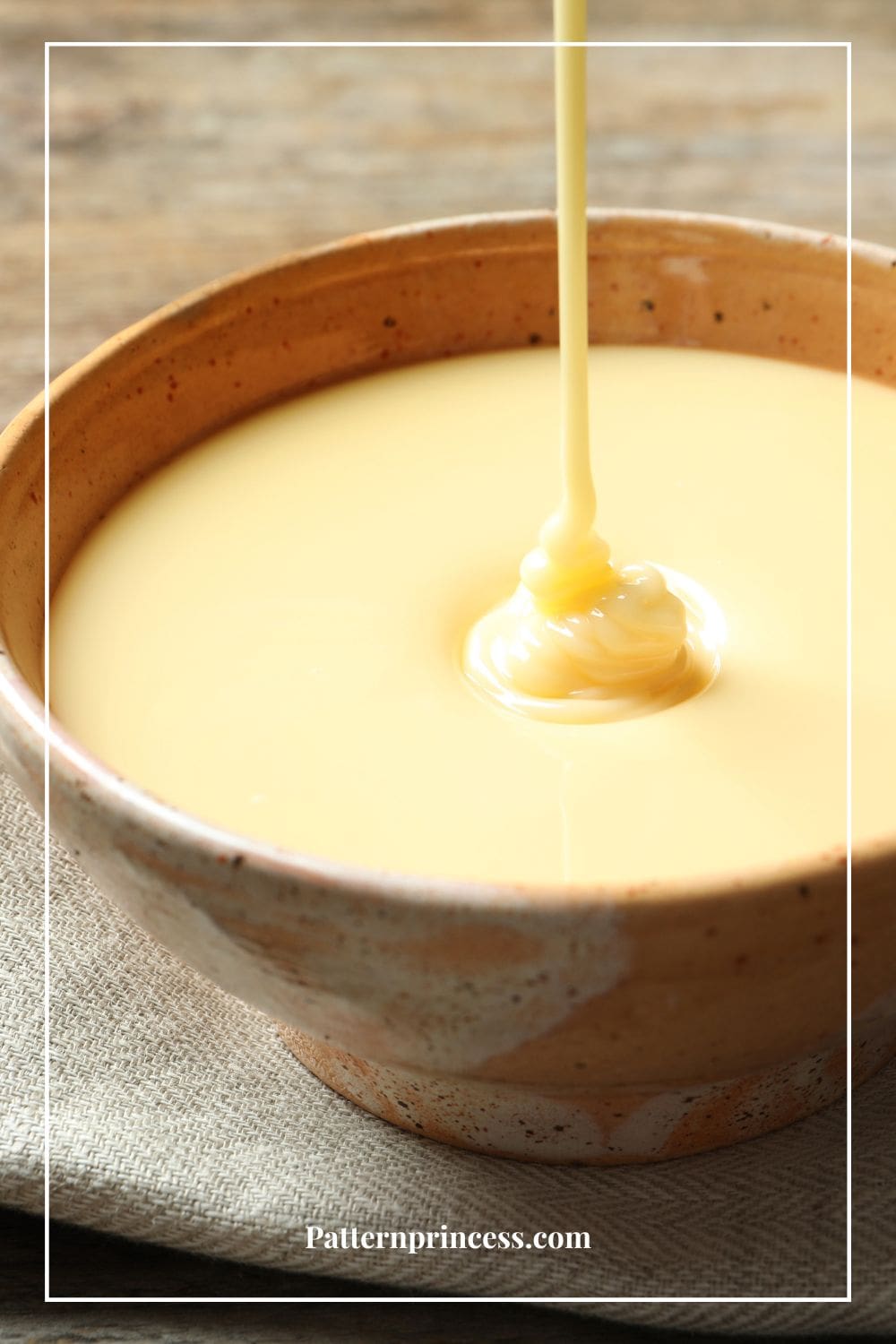
Creative Ways to Use Sweetened Condensed Milk
Sweetened condensed milk is a versatile and indulgent ingredient that can be used in a variety of creative ways to add sweetness and creaminess to your dishes. Here are some imaginative and delicious ways to use it:
Classic Desserts:
Fudge: Create rich and creamy fudge by combining sweetened condensed milk with chocolate and other flavorings.
Tres Leches Cake: This Latin American classic is a sponge cake soaked in a mixture of sweetened condensed milk, evaporated milk, and regular milk, resulting in a moist and sweet treat.
Beverages:
Vietnamese Iced Coffee: Mix sweetened condensed milk with strong brewed coffee and ice for a sweet and refreshing coffee drink.
Chai Latte: Sweeten your homemade chai latte by stirring in a spoonful.
Ice Cream and Popsicles:
Homemade Ice Cream: Make no-churn ice cream by folding sweetened condensed milk into whipped cream and adding your favorite flavors and mix-ins.
Popsicles: Create creamy popsicles by mixing sweetened condensed milk with fruit purees or flavored syrups.
Cocktails and Mocktails:
Piña Colada: Add sweetened condensed milk to your piña colada for an extra creamy and tropical twist.
Coconut Mojito: Make a creamy coconut mojito by blending it with fresh mint, lime juice, and rum or a non-alcoholic alternative.
No-Bake Treats:
Rice Krispies Treats: Replace marshmallows with sweetened condensed milk for a gooey and sweet twist on the classic recipe.
No-Bake Cheesecake: Use it to create a luscious and simple no-bake cheesecake filling.
Dipping Sauces:
Caramel Dip: Heat sweetened condensed milk to create a rich caramel sauce for dipping apple slices or drizzling over desserts.
Chocolate Fondue: Combine sweetened condensed milk with chocolate for a creamy chocolate fondue dip.
Condiments and Spreads:
Dulce de Leche: Slowly simmer sweetened condensed milk to create a caramel-like spread called dulce de leche. Use it on toast, pancakes, or as a filling for pastries.
Frosting: Whip sweetened condensed milk with butter and flavorings to make a creamy frosting for cakes and cupcakes.
Flavor Enhancements:
Hot Chocolate: Stir sweetened condensed milk into your hot chocolate for added richness and sweetness.
Yogurt Parfait: Layer sweetened condensed milk with yogurt and fruits for a decadent yogurt parfait.
Creative Cocktails:
White Russian: Use sweetened condensed milk in a White Russian cocktail for a sweeter and creamier twist on the classic recipe.
Key Lime Pie Martini: Create a dessert-inspired martini by combining sweetened condensed milk with key lime juice and vanilla vodka.
Cereal and Oatmeal: Drizzle a spoonful of sweetened condensed milk over your morning cereal or oatmeal for an extra indulgent breakfast treat.
Remember that sweetened condensed milk is quite sweet, so a little goes a long way. Be mindful of portion sizes to avoid overwhelming your taste buds with excessive sweetness.
Whether you’re making classic desserts or experimenting with new culinary creations, sweetened condensed milk can add a delightful and creamy touch to your recipes.
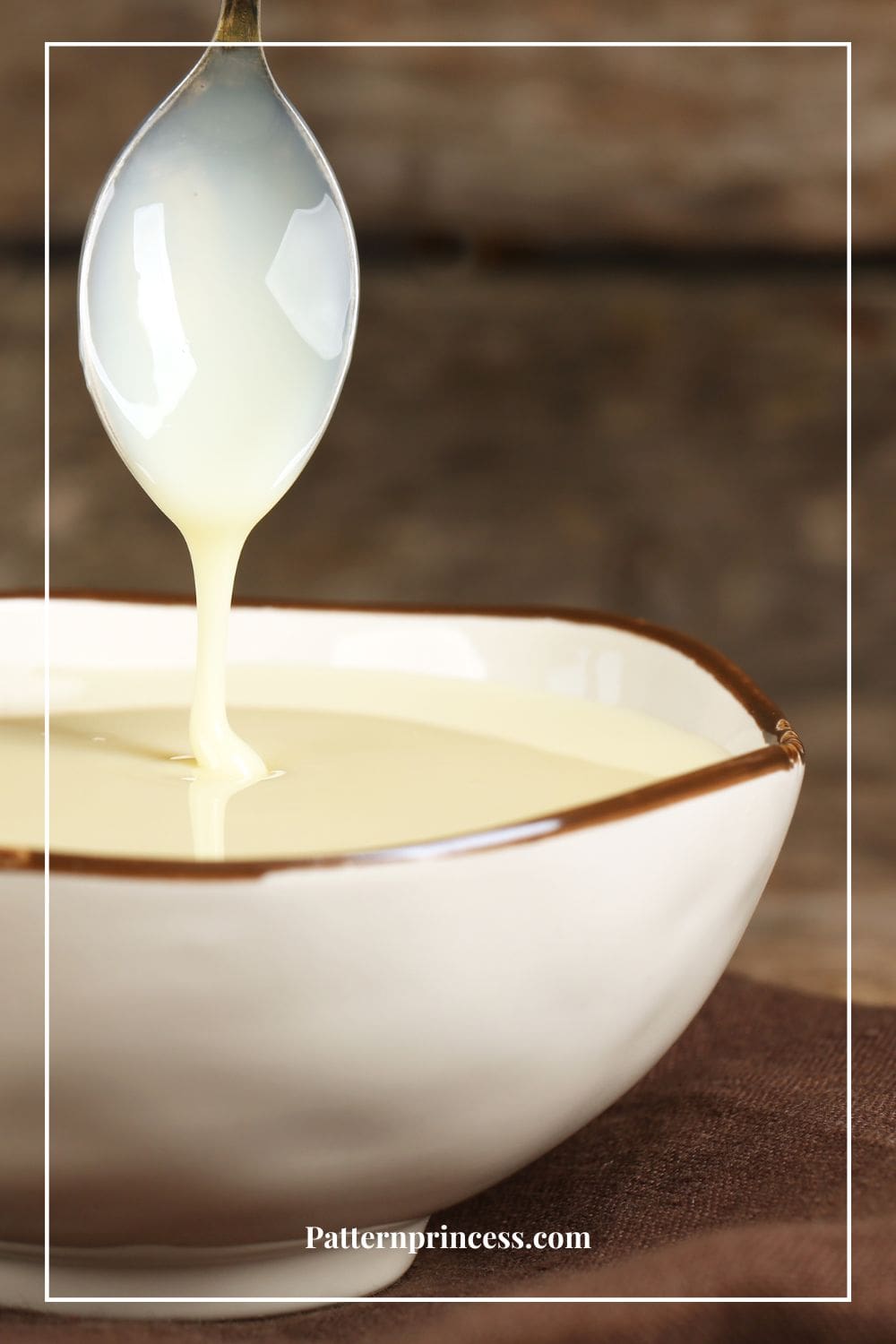
Is Condensed Milk Good for Your Health?
Sweetened condensed milk is a delicious and versatile ingredient in cooking and baking, but it’s not considered a health food. Here are some factors to consider regarding the health implications of consuming condensed milk:
High in Sugar:
Condensed milk is extremely high in sugar, which can contribute to weight gain, dental issues, and an increased risk of chronic conditions like type 2 diabetes and heart disease when consumed in excess. The sugar content primarily comes from added sugars during the preparation process.
High in Calories:
Due to its concentrated nature, sweetened condensed milk is calorie-dense. Consuming it in large quantities can lead to an excessive calorie intake, which may contribute to weight management challenges.
Low in Nutrients:
Sweetened condensed milk is devoid of essential nutrients like vitamins, minerals, and fiber. It provides mostly empty calories in the form of sugar and saturated fat.
Saturated Fat:
Condensed milk contains saturated fat, which, when consumed in excess, can raise levels of LDL (bad) cholesterol in the blood and increase the risk of heart disease.
Lactose Content:
For individuals who are lactose intolerant, sweetened condensed milk may cause digestive discomfort due to its lactose content. In such cases, lactose-free or dairy-free alternatives may be better options.
Allergies and Dietary Restrictions:
Condensed milk is a dairy product, which means it’s not suitable for those with dairy allergies or following a vegan diet. However, there are dairy-free and vegan alternatives available.
Moderation is Key:
While sweetened condensed milk isn’t a health food, enjoying it in moderation as part of a balanced diet can be a treat. Using it sparingly in recipes can add a touch of sweetness and creaminess without overloading your diet with sugar and calories.
If you’re concerned about the health implications, consider looking for healthier alternatives when possible. You can experiment with homemade versions using alternative sweeteners and non-dairy milk options to better suit your dietary needs and preferences.
Ultimately, like many indulgent ingredients, it’s best to enjoy condensed milk in moderation and be mindful of its nutritional impact as part of your overall diet.
How to Make Homemade Sweetened Condensed Milk Recipe
As an Amazon Associate I earn from qualifying purchases.
Kitchen Essentials
Ingredients
- 2 cups whole milk (for a dairy version) or a dairy-free alternative (such as coconut milk, almond milk, or soy milk)
- 1 cup granulated sugar
- A pinch of salt optional, for flavor enhancement
- 1 teaspoon pure vanilla extract optional, for added flavor
text ingredients
Instructions
- Combine Ingredients: In a heavy-bottomed saucepan, combine the milk and sugar. If desired, add a pinch of salt for enhanced flavor and 1 teaspoon of pure vanilla extract for a touch of sweetness.2 cups whole milk, 1 cup granulated sugar, A pinch of salt, 1 teaspoon pure vanilla extract
- Heat the Mixture: Place the saucepan over low heat and stir continuously until the sugar is completely dissolved. Be patient during this step to ensure the sugar fully incorporates into the milk. Avoid letting the mixture stick to the bottom of the pan.
- Simmer and Reduce: Once the sugar is dissolved, increase the heat to medium-low and let the mixture gently simmer. Stir frequently to prevent it from sticking or burning. As it simmers, the liquid will gradually reduce in volume and thicken. This process can take approximately 30 to 45 minutes.
- Check for Desired Thickness: Continue simmering until the mixture has thickened to your liking, resembling the texture of traditional sweetened condensed milk. Keep in mind that it will continue to thicken as it cools, so it’s okay if it’s slightly runnier than desired during cooking.
- Cool and Store: Remove the saucepan from the heat and allow the condensed milk to cool to room temperature. As it cools, it will continue to thicken. Once cooled, transfer it to a clean, airtight container.
- Refrigerate: Store your homemade sweetened condensed milk in the refrigerator. It will keep for several weeks, ready to use whenever you need it for various recipes, desserts, coffee, or tea.
Your Own Private Notes
Notes
Recipe Tips:
- Stirring frequently is crucial to prevent scorching and ensure even thickening.
- Adjust the sugar quantity to suit your desired level of sweetness.
- The process may take some time, so be patient. The end result will be worth it.
- Homemade sweetened condensed milk may be slightly less thick than store-bought varieties but should work well in most recipes.
Nutrition
A few of my favorite things
The Power of Positivity

You can find Victoria crocheting, quilting, and creating recipes. She has cooked in restaurants for over 20 years, including many larger parties. She learned to crochet when she was just 11 years old and has been crocheting ever since; over 50 years now. Over 40 years ago, she loved her first class in sewing and continues to hone her skills in quilting. Many have enjoyed the handmade gifts over the years. In her professional career, she has worked in management in a wide variety of businesses including higher education as a dean of a division. All the while attending college part-time to achieve her doctorate in higher education with an emphasis in e-learning.

